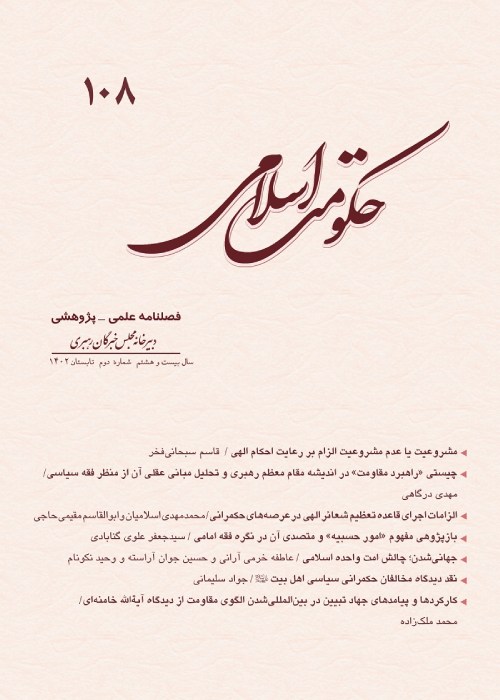An Analysis of the Necessity of enforcing the Religious laws and observing Religious Values by the Islamic Government
Author(s):
Abstract:
Discussions about the government and the way in which it is obliged to enforce the laws and observe the religious values as well as the assessment of its conditions and principles can be taken to be among issues in political jurisprudence. This article aims to make an analysis of the subject in question in three areas: the relationship between the right of the Islamic government to interfere in making laws be enforced and to observe religious values along with people’s feeling of contentment in seeing the Islamic laws enforced; the conditions which oblige the government to enforce the injunctions for which religion has not assigned any form of punishment; and the explanation for the principles according to which the Islamic government is obliged to enforce the religious laws for which no punishment has been assigned in religion.
The findings of the writers are as follows: taking into account of the divine legitimacy of government as well as the life-style of the Prophet Muhammad and the Infallible Imams (peace be upon them) and that of religious men, the enforcement of the religious injunctions, whether those ones for which no punishment has been assigned in religion, or the injunctions for which no punishment has been assigned in religion, are not dependent on the satisfaction of the majority of people from enforcing the Islamic injunctions. Those certain conditions which ensure the enforcement of the injunctions (judgements) for which religion has assigned no punishment are expressed into some statements as follows: injunctions are impersonal; actions may bring about social corruption; obligation is not concomitant with personal harm; obligation is correspondent to religious exigency; and correspondence between obligation and the life story of the sane people. The bases on which the Islamic government is obliged to enforce religious injunctions for which religion has assigned no penalty in religion are as follows: the relationship between the government and the preservation of rites and rituals and contempt for sacred things, enjoining the good and forbidding the evil and its relationship with the Islamic government, the overall aims and duties of the Islamic government, the responsibility for the enforcement of fixed penalties and punishments, the responsibility of the Islamic government in what it is called ‘benevolent action which requires a qualified religious jurist or his representative’ and applications of the arguments for social judgements.
The findings of the writers are as follows: taking into account of the divine legitimacy of government as well as the life-style of the Prophet Muhammad and the Infallible Imams (peace be upon them) and that of religious men, the enforcement of the religious injunctions, whether those ones for which no punishment has been assigned in religion, or the injunctions for which no punishment has been assigned in religion, are not dependent on the satisfaction of the majority of people from enforcing the Islamic injunctions. Those certain conditions which ensure the enforcement of the injunctions (judgements) for which religion has assigned no punishment are expressed into some statements as follows: injunctions are impersonal; actions may bring about social corruption; obligation is not concomitant with personal harm; obligation is correspondent to religious exigency; and correspondence between obligation and the life story of the sane people. The bases on which the Islamic government is obliged to enforce religious injunctions for which religion has assigned no penalty in religion are as follows: the relationship between the government and the preservation of rites and rituals and contempt for sacred things, enjoining the good and forbidding the evil and its relationship with the Islamic government, the overall aims and duties of the Islamic government, the responsibility for the enforcement of fixed penalties and punishments, the responsibility of the Islamic government in what it is called ‘benevolent action which requires a qualified religious jurist or his representative’ and applications of the arguments for social judgements.
Keywords:
Language:
Persian
Published:
Journal of Islamic government, Volume:23 Issue: 2, 2018
Pages:
33 to 58
magiran.com/p1923218
دانلود و مطالعه متن این مقاله با یکی از روشهای زیر امکان پذیر است:
اشتراک شخصی
با عضویت و پرداخت آنلاین حق اشتراک یکساله به مبلغ 1,390,000ريال میتوانید 70 عنوان مطلب دانلود کنید!
اشتراک سازمانی
به کتابخانه دانشگاه یا محل کار خود پیشنهاد کنید تا اشتراک سازمانی این پایگاه را برای دسترسی نامحدود همه کاربران به متن مطالب تهیه نمایند!
توجه!
- حق عضویت دریافتی صرف حمایت از نشریات عضو و نگهداری، تکمیل و توسعه مگیران میشود.
- پرداخت حق اشتراک و دانلود مقالات اجازه بازنشر آن در سایر رسانههای چاپی و دیجیتال را به کاربر نمیدهد.
In order to view content subscription is required
Personal subscription
Subscribe magiran.com for 70 € euros via PayPal and download 70 articles during a year.
Organization subscription
Please contact us to subscribe your university or library for unlimited access!


